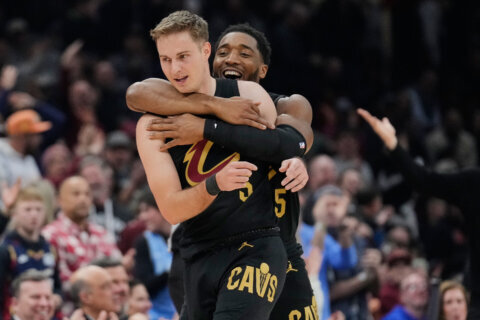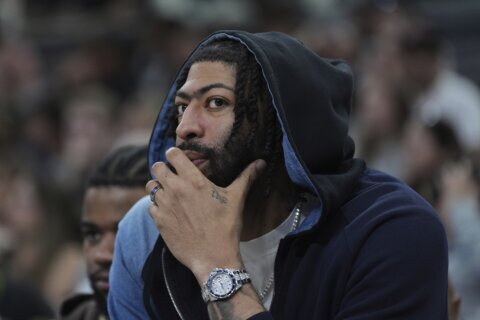WASHINGTON — You can’t simply measure seasons in terms of championships. There are too many variables, too many uncontrollable factors. Too much dumb luck.
What you can measure – and should – is progress. Ideally, if you’re working toward that ultimate goal of a title, you can at least point to tangible progress being made each season in that pursuit.
Despite a season that saw Bradley Beal join John Wall as an All-Star, the Washington Wizards found their 2017-18 campaign ending in familiar fashion Friday night. Their stars overworked and stretched past their limits, the Wizards bowed out in the first round, marking the 39th straight season they have failed to make it as far as the conference finals.
Washington had a better opening than they ever have in the John Wall era and perhaps will in the coming years, with a flawed Cavaliers team struggling to escape the Pacers in the first round and a fractured Celtics roster missing two of its best players. The Wizards had pulled even with Toronto, a team with its own playoff demons, through four games. They were two well-played, well-managed games from the chance to make the deepest run the franchise has made in decades.
There is a quotation attributed to Winston Churchill that feels applicable when discussing the breakthrough that Wizards fans are still waiting for: “Men occasionally stumble over truth, but most of them pick themselves up and hurry off as if nothing had happened.”
This year’s early playoff exit was particularly maddening for a number of reasons. The Wizards, forced to work around John Wall’s injury, stumbled upon a more open scheme that delivered the kind of crisp ball movement and tempo that other teams have thrived behind in today’s NBA. That early success shined a light on the team they might have been able to transform themselves into upon his return — one with a legitimate second unit capable of providing an effective counterpunch, doing more than just stealing minutes until the starters returned.
Instead, the Wizards devolved back into increasingly more of their former selves as their series against Toronto wore on. The Raptors had nine players average more than 15 minutes per game in the series – Wizards had just seven.
There were better times to use John Wall. Like when Washington needed just one measly win against, essentially, the bench of a 25-win Orlando Magic team to secure the seven seed instead of the eight. That would have given them the Celtics – a team they absolutely could have beaten – in the first round. Instead, Wall was rested, following the hard-line mentality that he wasn’t to play on back-to-back nights coming off his injury. The Wizards lost. Wall then played 234 minutes – 39 a game – in a futile six games against Toronto, 16 more than any other player.
Fatigue is the quiet plague that drags down all aspects of a team’s game. It leads to drives without finishes. Just look at how many shots Washington missed within a few feet of the rim in Game 6. It robs the legs of lift, leading to missed jumpers. In Games 5 and 6, the Wizards didn’t shoot spectacularly from the field through the first three quarters, but they were in position to win. Then came the fourth quarter, each time their undoing.
Fatigue also results in slow rotations and bodies out of position, especially on the defensive glass. The Raptors had 16 offensive rebounds to the Wizards’ 11, including a back-breaking seven in the final quarter alone. It leads to more ball-handling mistakes and fewer proactive plays on defense. Washington had its two lowest steal totals (6, 3) and two highest turnover totals (14, 15) of the series in Games 5 and 6.
In the end, they simply weren’t the team they expected to be all year long, even if they had the foundational pieces to be so. The Wizards were seventh in points per 100 possessions last year – this year, they were 14th.
There was reason to hope, when the team suddenly found better spacing and movement during Wall’s absence, that they might bring those lessons with them and diversify their offense upon his return. But they didn’t. Washington’s offense still too often bogged down into isolated, end-of-shot-clock action, never opening up a high percentage shot. All of this makes this Scott Brooks statement a little unnerving.
Asked about team depth and if it was an issue this season, Brooks mentioned how he felt the bench would have been better from the arc, but it wasn’t: “We definitely need some better shooting.”
— Candace Buckner (@CandaceDBuckner) April 28, 2018
The Wizards were third in the NBA in three-point shooting this year, at 37.5 percent as a team, trailing only the Warriors and Celtics. It’s not that they didn’t have shooters. It’s not that they didn’t have bench shooters – Tomas Satoransky (46.5 percent) and Mike Scott (40.5 percent) were two of the best three distance shooters on the team. It’s that they weren’t employed effectively enough to win games.
Yes, Otto Porter’s injury was a killer within this series. But on a night when the Utah Jazz leaned on Alec Burke – who had played less than six total minutes through the first five games of their series against Oklahoma City – for 11 key points in 17 minutes, the Wizards ran their starters out until they had ground them to dust.
Perhaps the Wizards’ front office can learn from Toronto’s depth, that they simply cannot rely on the roster as it is constructed, that depth is crucial not simply within the structure of the NBA Playoffs, but the marathon regular season that precedes them. Washington hasn’t been built strongly enough to make it past the second round even when healthy – with a single injury, even to one of their non-All-Stars, their depth is exposed even further.
The albatross contract of Ian Mahinmi means the front office will have to be creative to manage payroll under the cap. Perhaps finally having their own G League team to draw from will offer more immediate young talent options to help find the right combinations. No matter how they address it, the expansion of the bench with viable rotation pieces will be the difference between whether this team continues to spin its wheels or actually progress towards a championship.








